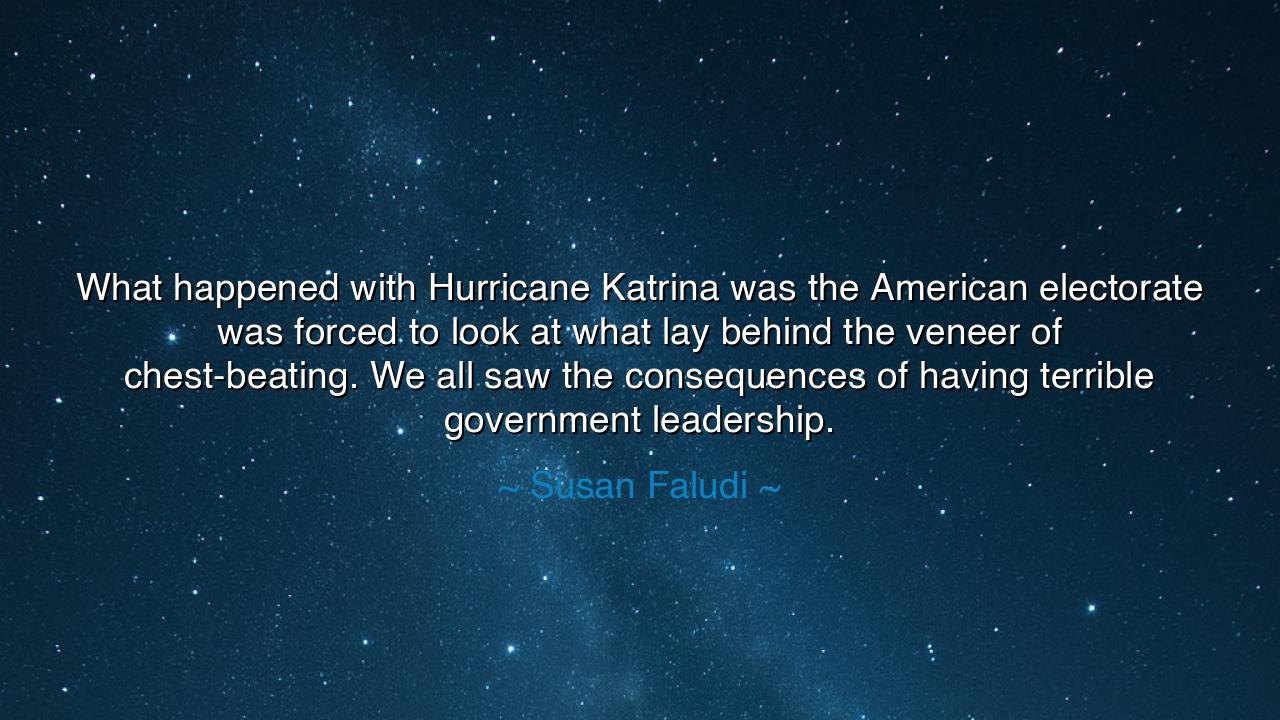
What happened with Hurricane Katrina was the American electorate
What happened with Hurricane Katrina was the American electorate was forced to look at what lay behind the veneer of chest-beating. We all saw the consequences of having terrible government leadership.






In the haunting and incisive words of Susan Faludi, we are given a mirror to the soul of a nation: “What happened with Hurricane Katrina was the American electorate was forced to look at what lay behind the veneer of chest-beating. We all saw the consequences of having terrible government leadership.” These words do not merely recount a tragedy of nature, but expose a deeper catastrophe — the collapse of human responsibility beneath the weight of pride and illusion. Faludi’s statement, like the cry of a prophet, reminds us that the storms that destroy cities often begin not in the heavens, but in the hearts of those who govern without humility.
The origin of this quote lies in the aftermath of one of America’s darkest hours — the devastation of Hurricane Katrina in 2005. When the winds subsided and the waters withdrew, what remained was not only ruin, but revelation. The storm tore away not just the roofs of homes, but the veneer of invincibility that the nation’s leaders had long worn. In the flooded streets of New Orleans, the world saw the truth Faludi speaks of — that beneath the “chest-beating” of political rhetoric, beneath the boasts of preparedness and power, lay neglect, disorganization, and indifference. The tragedy became a parable of pride: a reminder that leadership built on image and ego cannot withstand the storms of reality.
Faludi’s words reach beyond politics; they touch upon an ancient and eternal lesson — that hubris precedes downfall. In Greek legend, mighty kings and heroes, swollen with self-confidence, defied the gods and met destruction. So too, the modern state, drunk on its own might, often forgets the vulnerable — until nature or history forces its reckoning. The “chest-beating” Faludi describes is the same pride that brought down empires, from Rome’s decadent rulers to the arrogant monarchs of old Europe. It is the illusion of strength without substance, power without compassion. Katrina’s floodwaters, in this sense, were not only a physical deluge but a symbolic one — sweeping away falsehood and leaving truth exposed upon the shore.
Consider, for a moment, the story of King Lear, who ruled with authority but without understanding. Surrounded by flatterers, he mistook words of praise for loyalty and mistook his own vanity for wisdom. Only when he lost everything — his crown, his home, his sanity — did he see clearly what he had been blind to: that leadership without love is emptiness, and pride without empathy is madness. The leaders who failed New Orleans suffered the same blindness. In the comfort of offices and speeches, they saw numbers, not faces; they spoke of progress, while citizens drowned. And like Lear, they were humbled by their own illusions.
Faludi’s reflection also shines light upon the electorate, the people themselves — those who, as she says, were “forced to look at what lay behind the veneer.” A democracy is not destroyed by bad leaders alone, but by a people who do not look beyond appearances. When citizens worship image over integrity, slogans over substance, they invite deception. Katrina, in her terrible power, stripped away the masks — not just of the government, but of a society too long content to believe in the myth of its own perfection. What emerged from that storm was a painful awakening: that greatness cannot be proclaimed; it must be practiced.
There is also, within Faludi’s insight, a call to conscience. For every generation must decide what kind of leadership it will follow and what kind of truth it will demand. It is not enough to criticize from the comfort of hindsight; one must act with foresight. The American electorate, she implies, must learn to look beyond “chest-beating” — to seek humility in place of hubris, empathy in place of arrogance, service in place of spectacle. A nation’s strength does not lie in the noise of its boasts, but in the quiet diligence of its care for the weakest among its people.
Let this be the lesson passed down: when the next storm comes — whether of wind, of war, or of politics — do not be deceived by loud voices or shining surfaces. Judge your leaders not by how they boast in calm, but how they serve in crisis. For in times of trial, the true nature of power is revealed. Demand from those who lead not grandeur, but goodness; not slogans, but sincerity. And in your own life, lead as you wish the mighty to lead — with humility, vigilance, and heart.
For as Susan Faludi teaches through the memory of Katrina, the test of a nation is not how loudly it proclaims its strength, but how tenderly it protects its people. When pride governs, suffering follows. But when truth reigns — when compassion and competence walk hand in hand — even the fiercest storm cannot destroy the foundations of a just society. Let this truth endure, like a lighthouse rising above the floodwaters, guiding all who seek to lead — and all who dare to follow — toward wisdom, humility, and light.






AAdministratorAdministrator
Welcome, honored guests. Please leave a comment, we will respond soon